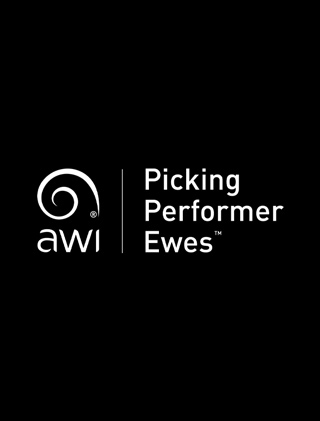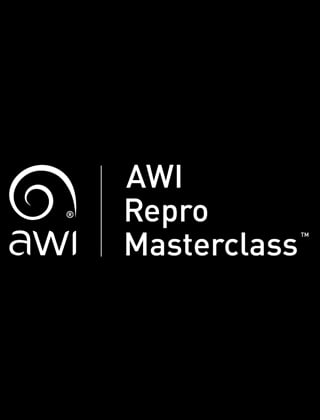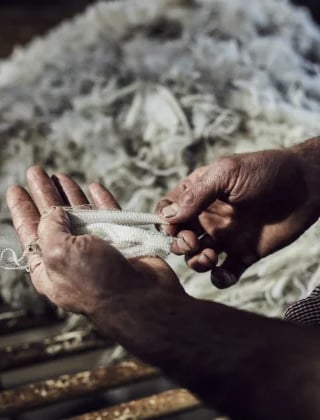Wool careers promoted in AgDay webinar
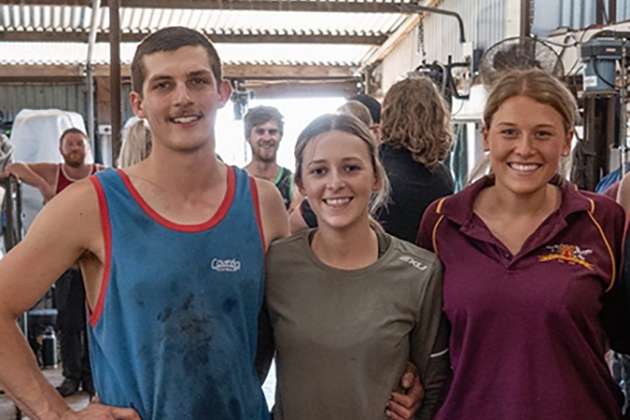
Young people from across the country tuned in to an AWI webinar in November to hear from six inspirational young people about their careers in the wool industry.
Young people from across the country tuned in to an AWI webinar in November to hear from six inspirational young people about their careers in the wool industry.
Held on National Agriculture Day on 18 November, the AWI webinar featured six young professionals promoting the wide range of career opportunities available in Australia’s wool industry. The webinar included a live cross to a working shearing shed in South Australia so viewers could see sheep shearing, wool handling and classing.
The hour-long webinar was an interactive session with viewers able to ask questions for the six panel members to answer live. Many school classes tuned in to the webinar.
Below are small excerpts from the webinar.
More information: View a recording of the webinar at www.youtube.com/AWIWoolProduction
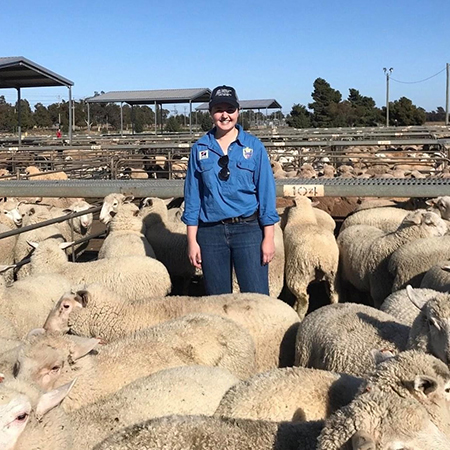
Dione Howard
NSW Local Land Services District Veterinarian, based in Wagga Wagga
Dione Howard’s journey in the wool industry began as the sixth generation on her family’s Merino property near Lockhart in the Riverina of NSW. She studied veterinary science at Charles Sturt University and has been a District Veterinarian for NSW Local Land Services for the past 4½ years. She is Agricultural Shows Australia 2022 National Rural Ambassador, and an Action4Agriculture Board Member and Young Farming Champion.
“I work as a veterinarian predominantly with sheep and I’m based in the Riverina area of NSW. I work with farmers every day to make sure that their sheep are healthy so that they grow high quality wool. I do farm visits to undertake disease investigations and I also attend visits to the sale yards at Wagga which has up to 80,000 sheep each week,” Dione said.
“I grew up on a farm and love working with livestock. I studied agriculture as a subject in the HSC in year 12, and all the way through high school. I absolutely loved agriculture and science subjects so that encouraged me to study veterinary science at university. I went on to Charles Sturt University in Wagga; it’s a six-year course and you get to study all different species but there is a livestock focus.
“You can become a vet whatever your background, whether you grew up on the coast or in the city. People from all across Australia came to study vet science at Charles Sturt University where we all got the same skill set and have the same passion for keeping animals fit and healthy.
“Every day I get to work with farmers and my favourite species, which is sheep. I’ve been working as a veterinarian very close to the town where I grew up so I’m lucky to get to work quite often with people that I already know.”
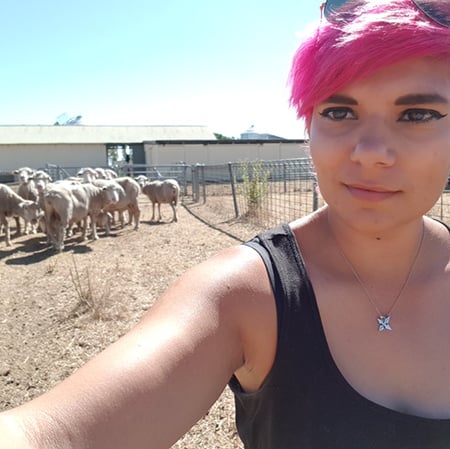
Danila Marini
Livestock researcher at the University of Adelaide
Originally a city kid, Danila hadn’t been near anything remotely like a farm until about nine years of age, but always had a passion for animals. Danila studied animal science at the University of Adelaide and did a PhD at the University of New England. Danila has worked for CSIRO, and has been a researcher at the University of Adelaide for the past 10 months. Danila is also a Young Farming Champion.
“I’ve always loved animals but when I was younger I didn’t know exactly what career I wanted – maybe a vet, zoo keeper, or farmer. It wasn’t until I had a look at Adelaide University’s Roseworthy Campus and was exposed to livestock and research that I really had my interests piqued,” Danila said.
“Being interested in research, I went straight from my degree into an Honours degree, which is basically like dipping your toes into research. You get to run your own little research project for about a year and you get to write it up, exactly how a scientist would run a normal experiment. I got to investigate the stress response of lambs that had been through a difficult pregnancy and how they could cope in the environment. That sparked my love for sheep. Working with them for nine months straight was absolutely fantastic.
“I went on to do a PhD with CSIRO at the University of New England in NSW, looking at self-medication mainly in sheep. That was a lot of fun and it led me down the path of working on animal behaviour and welfare.
“I now specialise in sheep. Most of my work currently is looking at ways that we can help farmers improve the welfare of sheep so they stay healthy and happy. That could be through finding new pain relief drugs and ways to provide them, or ensuring that technology such as virtual fencing doesn’t negatively impact their animals.”
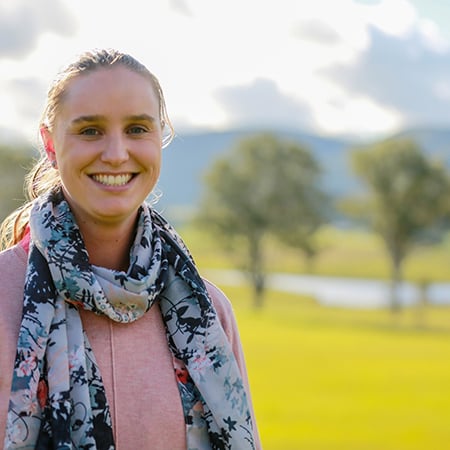
Chloe Dutschke
Career development officer for AgCAREERSTART, based near Hay in NSW
Originally from the Clare Valley in South Australia, Chloe really wanted to work in a career related to animals. She studied animal science at the University of Adelaide and now works for a National Farmers Federation gap-year program called AgCAREERSTART, a 10-12 month program that helps to kick-start careers in farming. Chloe is a Young Farming Champion and a committee member of the Peter Westblade Scholarship and the Hay Inc Rural Education Program.
“I didn’t have a background in agriculture, I didn’t grow up on a farm. We lived on a little hobby block, but I really wanted to work in a field that I could work with animals,” Chloe said.
“Originally I thought I wanted to be a veterinarian or work in the wildlife field but, after I did some work experience and studies, that didn’t seem to fit with where I wanted to go. I started to see more opportunities in the livestock sector so as I moved through my university degree I took lots of different opportunities to learn.
“After university, I got a job as a jillaroo on a sheep station in the Flinders Ranges in South Australia. I worked there for two years which was a fantastic opportunity – it was a lot of fun. I then went contract mustering on properties in South Australia and NSW for about three years – I saw some wonderful scenery, met some really wonderful farmers and got to learn lots of new tools and tricks of the trade.
“In 2020 I took a position as senior station hand on a property in Hay and that’s where I currently am. I really want to encourage more young people into agriculture, so at the start of 2022 I began a position with the AgCAREESTART gap year program where we place young people aged 17-25 looking to go into agricultural roles; we match them with farmers that are looking for employees. You get a full-time job, you get a wage and through the program you’re also getting a training and engagement bursary. Check out agcareerstart.com.au for details.”
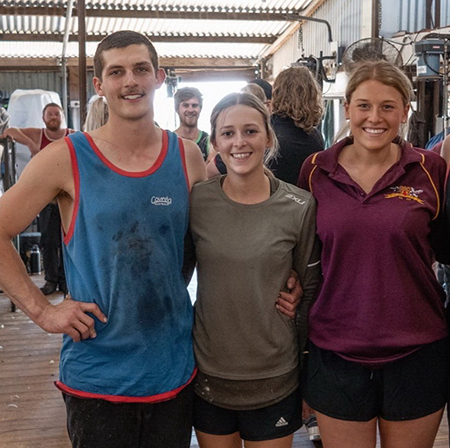
Lochie Reichelt
Shearer
“I was 19 when I started shearing. This will be my fifth year in the industry and I’m definitely planning on staying in the industry. You kind of fall in love with it and keep doing it. I like the atmosphere in the workplace, how rewarding it feels after a good day in the shed. You meet some good people and learn life skills along the way which is awesome,” Lochie said.
“I’m always open to learning. I’ve been to several shearing schools and workshops with some top-class trainers, which has really helped me learn a lot. I currently shear an average of about 200 sheep per day, which earns me about $800 each day.”
Sarah Haynes
Wool handler and classer
“I’ve been a wool handler for three years and classing for about seven months. I love everything about my job. I love wool and I love the sheep. I like how it’s a bit of a competition every day with yourself, keeping up with the shearers, it’s a fast-paced job and you get rewarded for it. It’s a really good gap year job because it’s a lot of money in a short amount of time. There are a lot of career pathways,” Sarah said.
“You can travel almost anywhere in Australia and around the world. Shearers get paid per sheep so the faster they work the more money they earn; they can kind of be their own boss in a way. It’s quite motivating to know that you can earn more as your skills build up.”
Annabelle Haynes
Wool handler and videographer
“I’ve been working in the wool industry on and off for about eight years now. I started with my gap year, just to save up a bit of money and to travel around before I went to university,” Annabelle said.
“It was a great opportunity to work all across Australia and meet a heap of people and learn a lot of skills, about being independent and living on your own and all that kind of thing. I had a really great experience. I love the job.”
This article appeared in the March 2023 edition of AWI’s Beyond the Bale magazine. Reproduction of the article is encouraged.






